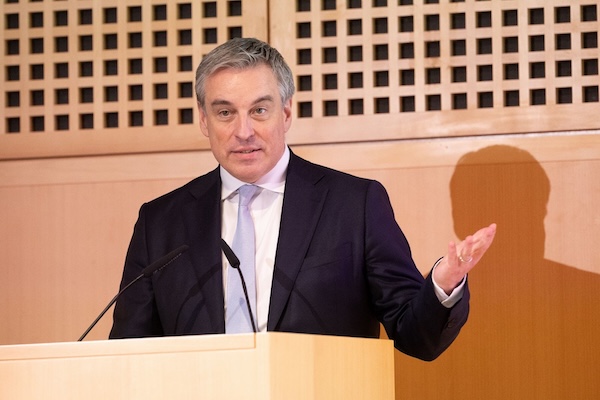 Claude Meisch, Luxembourg’s Minister of Education, Children and Youth;
Credit: SIP, Claude Piscitelli
Claude Meisch, Luxembourg’s Minister of Education, Children and Youth;
Credit: SIP, Claude Piscitelli
On Monday 12 May 2025, the conference “The First 1,000 Days and Neurodevelopmental Disorders: Challenges and Perspectives” took place at the Musée d'Art Moderne Grand-Duc Jean (MUDAM) in Luxembourg-Kirchberg.
As reported by Luxembourg’s Ministry for Education, Children and Youth, Ministry for Family Affairs, Solidarity, Living Together and Reception of Refugees and Ministry of Health and Social Security, the event brought together professionals from the health, social care and education sectors. The focus for the event was on the mental and physical health of a child during their first 1,000 days and promoting the well-being of both mother and child, encouraging environments which support healthy foetal and infant development. The initiative also highlighted the need for early, coordinated action to ensure every child has a strong start in life and is given fair access to care.
As reported by the ministries, the first 1,000 days play a crucial role in a child’s physical, mental and emotional development. Neurodevelopmental disorders, especially autism spectrum disorders, are still identified too late in many cases. Access to support and care remains a challenge and early detection involves watching for unusual signs that may indicate a developmental difference.
Luxembourg’s Minister of Health and Social Security, Martine Deprez stated: “To support a child well, we must understand all aspects of their development, including emotional bonds and environment. By acting early and holistically, we can help prevent many developmental difficulties and support children’s overall well-being.”
Luxembourg’s Minister of Education, Children and Youth, Claude Meisch, added: “The first years of life, from birth to age three, form a decisive phase for a child’s healthy development. This period shapes their cognitive, motor and social skills more than any other. We must give it the attention it deserves and offer meaningful activities that help children thrive. That is why we have worked with educational partners to make a clear recommendation: avoid exposing children under the age of three to screens and prioritise human interaction, which is essential for their development.”
The event highlighted that to strengthen existing partnerships and ensure a joined-up approach centred around the child, professionals in healthcare, education and social work need to collaborate closely. Nurseries and schools have a central role in this. By raising awareness of emotional well-being from an early age and aligning detection procedures, a more effective collective response can be achieved. Training sessions focusing on early bonding, spotting warning signs and developing relational and emotional skills will reinforce this approach.
The ministries have announced that a training day on identifying early signs of neurodevelopmental disorders will take place in late November 2025. The event, aimed at GPs and paediatricians, will be organised by the Health Directorate in partnership with the child psychiatry and assessment teams at the Centre Hospitalier de Luxembourg (CHL).
Luxembourg’s Minister for Family Affairs, Solidarity, Living Together and Reception of Refugees, Max Hahn, said: “Asking families to face the complexity of a child’s additional needs alone is not right. We need a whole-system approach that includes tailored support, specialised educational services and opportunities for families to connect, share experiences and find respite.” He added: “To this end, we are working on a new short-term care scheme. It will give families the chance to live temporarily in supervised accommodation, where they will receive targeted support. This will offer a space to regain balance, rebuild family bonds and strengthen trust - while reducing the risk of comorbidities, family breakdown or court involvement. The goal is to lay the groundwork for long-term, multidisciplinary support.”
The ministries noted that to truly meet children’s and families’ needs, access to specialised services must be improved, multidisciplinary teams need to be reinforced, support systems should be tailored to reflect the country’s cultural and linguistic diversity and that closer cooperation between all actors would ensure fair, well-rounded and life-appropriate care for every family.
The ministries announced that existing care for children up to the age of four with neurodevelopmental disorders will now be extended up to the age of six and in 2026, a new branch of the Early Rehabilitation Service (SRP) - Hëllef fir de Puppelchen asbl, dedicated to children up to the age of six - will open in the “Santé” building at the Cité de l’Enfance in Pétange.
Moreover, the ministries noted that the conference marks a step forward in strengthening existing systems for prevention, early identification and cooperation between professionals and reaffirms a national commitment to making mental health prevention in the first 1,000 days a core public health priority.








